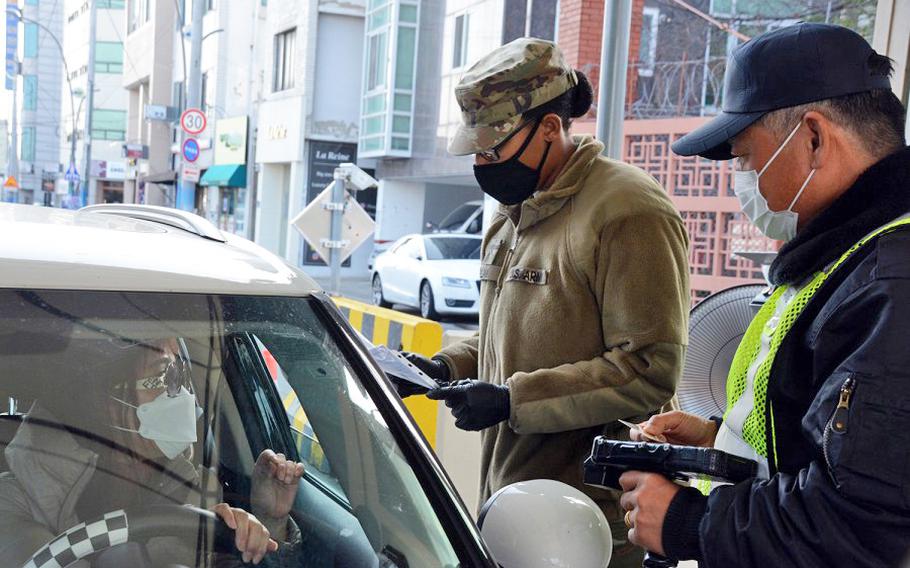
Pvt. Daija Gillam, 22, of the 25th Transportation Battalion, screens drivers before allowing them to enter Camp Walker in the coronavirus-hit city of Daegu, South Korea, Saturday, Feb. 22, 2020. (Kim Gamel/Stars and Stripes)
SEOUL, South Korea — After two more U.S. military dependents tested positive for COVID-19, the Army commander in the epicenter of South Korea’s coronavirus outbreak pleaded with his community on Thursday to help maintain the “bubble” protecting the garrison as the new coronavirus spreads outside.
Confirmation that an active-duty American service member’s dependent and the spouse of a civilian Defense Department employee had been infected raised to six the number of confirmed cases affiliated with U.S. Forces Korea.
All were in the southeastern city of Daegu or surrounding areas, which have been hardest hit by the respiratory virus as South Korea’s overall toll increased to more than 6,000, with 40 deaths.
USFK, which commands some 28,500 American troops on the divided peninsula, has restricted access to installations, barred service members from nonessential outside activities and implemented health checks at entry gates to contain the virus.
The six cases, including a soldier and his wife, involved people who lived off post, officials said.
Col. Edward Ballanco, commander of the Daegu garrison, expressed concern that at least two civilians were not following advice to avoid city facilities and warned that entry privileges would be revoked if necessary.
“We absolutely don’t want to do that, but our priority is to protect the community,” he said Thursday during a Facebook live update.
USFK has raised its coronavirus risk level to “high.” But Ballanco said that on post it’s “extremely low because we’ve created a bubble for our community.”
“We’ve got our bubble established,” he added. “It’s holding; it’s working; our community has not had an outbreak. We’ve had a couple isolated cases and that’s it.”
The service member’s dependent “had been in self-quarantine since Feb. 26 and had not been in contact with any other USFK affiliated person,” so health authorities decided no probe into possible contact with others was needed, according to a press release.
The patient was in isolation under direct U.S. military medical care and supervision, it said.
The civilian dependent had been in self-quarantine since Feb. 28 and had not been in contact with anybody other than her spouse since then, USFK said, adding that both had been quarantined at their residence.
South Korean and U.S. military health professionals were conducting a trace investigation to determine whether anyone else may have been exposed, according to USFK.
The woman said she hadn’t been on post since Feb. 21, and the Defense Biometric Identification System used to control access showed that to be true, Ballanco said.
However, further investigation showed that she had entered the commissary and post exchange on Feb. 27, according to scans of her ration card that’s needed for purchases, he said, without elaborating.
Both facilities had been temporarily closed, cleaned and reopened, he said. The latest cases follow an announcement that an American soldier and his wife had been infected and placed in an isolation unit. They have a baby, but USFK has not provided information about the child’s condition, citing privacy concerns.
The widow of an American military retiree and a South Korean USFK employee also have been infected.
“USFK remains at risk level ‘high’ peninsula-wide and is implementing all appropriate control measures to help mitigate the spread of COVID-19 as a prudent measure to protect the force,” the press release said.
The announcement came days after the U.S. military sent the first group of replacement troops and some family members to Army Garrison Daegu in more than a week despite a State Department warning against travel to the area.
The soldiers and dependents, who had been held up at Camp Humphreys due to the outbreak, were sent from bases to base and would not be exposed to the outside community due to the crisis, officials said.
The decision came as the U.S. military struggles to balance the need to protect its forces from the deadly virus while maintaining readiness against the growing nuclear threat from North Korea.
“They’re going to a military installation that is pretty well — as well as it can be — protected from what’s going on outside in the city of Daegu,” Maj. Gen. Patrick Donahoe, the Eighth Army’s deputy commander for operations, told Stars and Stripes on Tuesday.
Stars and Stripes reporter Yoo Kyong Chang contributed to this report.
gamel.kim@stripes.com Twitter: @kimgamel